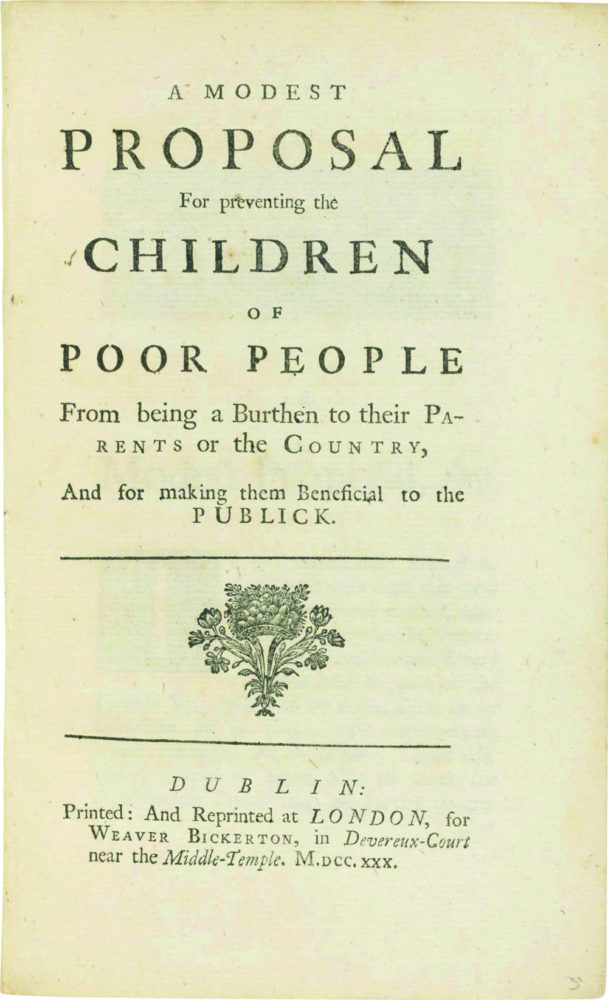 Menu
Menu
 Menu
Menu
What motivates a person to write one of history’s greatest satires?
In his youth, Jonathan Swift was a student at Ireland’s Kilkenny College. Kilkenny College teachings were rooted in an idea called political arithmetic. Political arithmetic was a view in the 17th and 18th centuries that statistics and numbers alone can explain society, economics, and politics. This numbers-based approach emphasised “rationality,” but ignored our less-rational human qualities such as passions, opinions, and appetites.
Jonathan Swift didn’t buy into political arithmetic. He believed that a rational idea taken to its limit would produce an irrational result. This led him to write books and essays that challenged the pure rationalism of political arithmetic. The most famous example was A Modest Proposal.

An early edition of A Modest Proposal. Swift feared persecution for his writing so did not put his name on the pamphlet.
A Modest Proposal made a rational economic argument to propose something unthinkable: have poor Irish families—who mostly were Catholic—sell their children to the rich to be eaten. Swift argued that:

The Bell Tower at Trinity College, Dublin, the university where Swift earned his Doctor of Divinity.
As a purely economic argument, eating poor Irish children makes sense. It returns landlords to Ireland to pay tithes; it provides incomes and incentives for both the poor and the rich; and it absolves the government of social welfare expenses. Together, this would reduce Ireland’s poverty and famine.
At no point did the essay consider the moral and ethical issues surrounding cannibalism.
Admittedly, Swift’s argument also dabbled in human considerations such as appetites. At one point, A Modest Proposal said that children were both wholesome and delicious. However, at no point did the essay consider the moral and ethical issues surrounding cannibalism.
Of course, Swift wasn’t serious about eating children. He was using satirical irony to expose the narrow-mindedness of political arithmetic. Put another way, Swift was telling us that pure economic arguments make for poor public policies.
Exposing political arithmetic was not Swift’s only motivation for writing A Modest Proposal. The way England ruled over Ireland in Swift’s time also motivated him.
In 1729, Ireland’s ruling class were the Anglo-Irish. The Anglo-Irish were Protestants associated with England, Ireland’s colonial ruler. The Anglo-Irish held positions of power in Ireland’s church, government, and business community. They used this power to rule over and discriminate against Ireland’s Catholic majority.
Jonathan Swift was a member of the Anglo-Irish ruling class. Like most of the Anglo-Irish, Swift was no friend of Ireland’s poor Catholic majority. In fact, Swift believed that the poor’s problems were largely the result of their own shortcomings. He preached in St. Patrick’s Cathedral that Irish Catholics were uncivilised and ignorant.
While the Anglo-Irish were the most powerful people in Ireland, they were not free to rule Ireland however they pleased. Ireland was part of the United Kingdom, and the government back in London constantly meddled in Irish affairs. The meddling left the Anglo-Irish unable to independently govern Ireland.
The Anglo-Irish believed that if England just got out of their way, they could solve all of Ireland’s problems. In fact, ten serious ideas to solve Ireland’s poverty problems are embedded towards the close of A Modest Proposal. Each proposal had at one time or another been proposed by the Anglo-Irish elite. And each proposal was ignored or shot down by England.
Of course, the lunacy of a society that leaves the poor to starve is clear to most readers of A Modest Proposal. However, Jonathan Swift did not write A Modest Proposal simply to expose the cruelty of leaving people to starve. He also wrote it as a reaction to a colonial government in England that would not empower his own class—the Anglo-Irish elite—to independently solve Ireland’s problems.

Dublin’s St. Patrick’s Cathedral, the church where Swift preached after 1714.
Jonathan Swift was born in Dublin in 1667. His father died before he was born, and he and his mother moved to England shortly after his birth. Swift returned to Ireland for his education. He received a Doctor of Divinity from Trinity College, Dublin in 1702.
Following his education, Swift preached, wrote, and involved himself in Irish politics. However, he frequently visited London, where he kept company with influential writers and politicians. In 1710, he moved there for a job with England’s Tory government. He hoped the job would be a stepping stone to a bishopric at an English church.
Unfortunately for Swift, Queen Anne did not like his writing, being particularly annoyed by A Tale of a Tub and The Windsor Prophecy. Her dislike of Swift was a reason why he never received a bishopric in England. Instead, Swift was sent back to Ireland in 1714 to be the Dean of Dublin’s St. Patrick’s Cathedral.
At first, Swift was disappointed. Ireland was viewed as a colonial backwater. However, the move ultimately worked to Swift’s advantage. Being slighted by English colonial rulers opened Swift’s eyes to the dark side of power and authority.